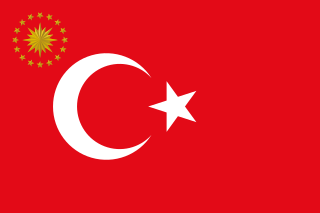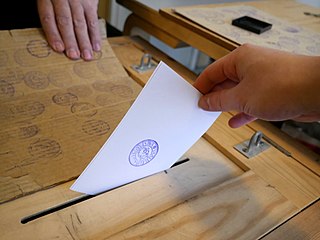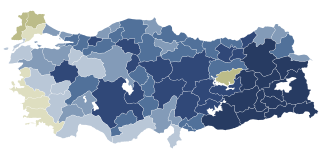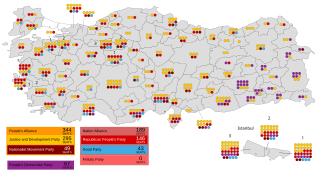
The president of Turkey, officially the president of the Republic of Türkiye, is the head of state and head of government of Turkey. The president directs the executive branch of the national government and is the commander-in-chief of the Turkish military. The president also heads the National Security Council.
Direct election is a system of choosing political officeholders in which the voters directly cast ballots for the persons or political party that they desire to see elected. The method by which the winner or winners of a direct election are chosen depends upon the electoral system used. The most commonly used systems are the plurality system and the two-round system for single-winner elections, such as a presidential election, and proportional representation for the election of a legislature or executive.

A presidential election is the election of any head of state whose official title is President.

Elections in Mauritania encompass four different types: presidential elections, parliamentary elections, regional elections and local elections.
Regular elections in Croatia are mandated by the Constitution and legislation enacted by Parliament. The presidency, Parliament, county prefects and assemblies, city and town mayors, and city and municipal councils are all elective offices. Since 1990, seven presidential elections have been held. During the same period, ten parliamentary elections were also held. In addition, there were nine nationwide local elections. Croatia has also held three elections to elect members of the European Parliament following its accession to the EU on 1 July 2013.

France is a unitary semi-presidential republic with a bicameral legislature. Public officials in the legislative and executive branches are either elected by the citizens or appointed by elected officials. Referenda may also be called to consult the French citizenry directly on a particular question, especially one which concerns amendment to the Constitution.

Romania elects on a national level a head of state – the president – and a legislature. The president is elected for a five-year term by the people. The Romanian Parliament has two chambers. The Chamber of Deputies has currently 330 members, elected for a four-year term by party-list proportional representation on closed lists. The Senate has currently 136 members, elected for a four-year term by party-list proportional representation on closed lists.

Elections in Benin take place within the framework of a multi-party democracy and a presidential system. Both the President and the National Assembly are directly elected by voters, with elections organised by the Autonomous National Electoral Commission (CENA).

Elections in Portugal are free, fair, and regularly held, in accordance with election law.

At the national level, the Republic of Cyprus holds elections for its head of state, the President of Cyprus, and for its legislature, the House of Representatives.

Elections in Gabon take place within the framework of a presidential multi-party democracy with the Gabonese Democratic Party, in power since independence, as the dominant party. The President and National Assembly are directly elected, whilst the Senate is indirectly elected.
Elections in the Philippines are of several types. The president, vice-president, and the senators are elected for a six-year term, while the members of the House of Representatives, governors, vice-governors, members of the Sangguniang Panlalawigan, mayors, vice-mayors, members of the Sangguniang Panlungsod/members of the Sangguniang Bayan, barangay officials, and the members of the Sangguniang Kabataan are elected to serve for a three-year term.
Elections in Luxembourg are held to determine the political composition of the representative institutions of the Grand Duchy of Luxembourg. Luxembourg is a liberal representative democracy, with universal suffrage guaranteed under its constitution. Elections are held regularly, and are considered to be fair and free.

Elections in Turkey are held for six functions of government: presidential elections (national), parliamentary elections (national), municipality mayors (local), district mayors (local), provincial or municipal council members (local) and muhtars (local). Apart from elections, referendums are also held occasionally.

The Government of Turkey is the national government of Turkey. It is governed as a unitary state under a presidential representative democracy and a constitutional republic within a pluriform multi-party system. The term government can mean either the collective set of institutions or specifically the Cabinet.

A constitutional referendum on electoral reform was held in Turkey on 21 October 2007. After the aborted attempt to elect the next president in May 2007, the government of Recep Tayyip Erdoğan introduced substantial electoral reforms in parliament which were then passed with the votes of Erdoğan's Justice and Development Party and the opposition Motherland Party.

General elections were held in Turkey on 24 June 2018. Presidential elections were held to elect the President of Turkey using a two-round system. Parliamentary elections took place to elect 600 Members of Parliament to the Grand National Assembly of Turkey.

The president of France is elected every five years.
In the federal system of the Federal Republic of Germany, the state parliaments embody the legislative power in the sixteen states. In thirteen of the sixteen German states, the state parliament is known as the Landtag. In the states Free Hanseatic City of Bremen and Free and Hanseatic City of Hamburg, the state parliament is called Bürgerschaft (Citizenry), in Berlin it is called Abgeordnetenhaus.

This national electoral calendar for 2023 lists the national/federal elections held in 2023 in all sovereign states and their dependent territories. By-elections are excluded, though national referendums are included.














